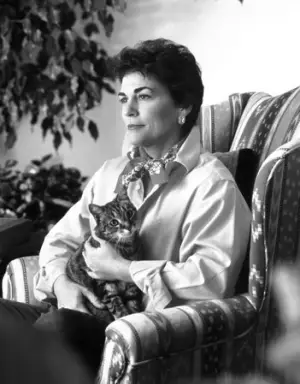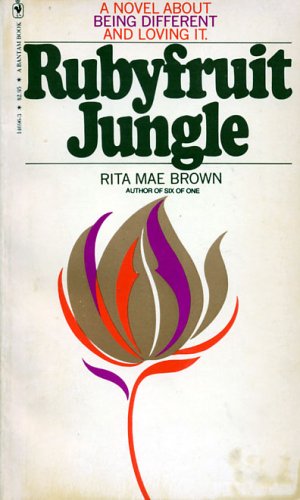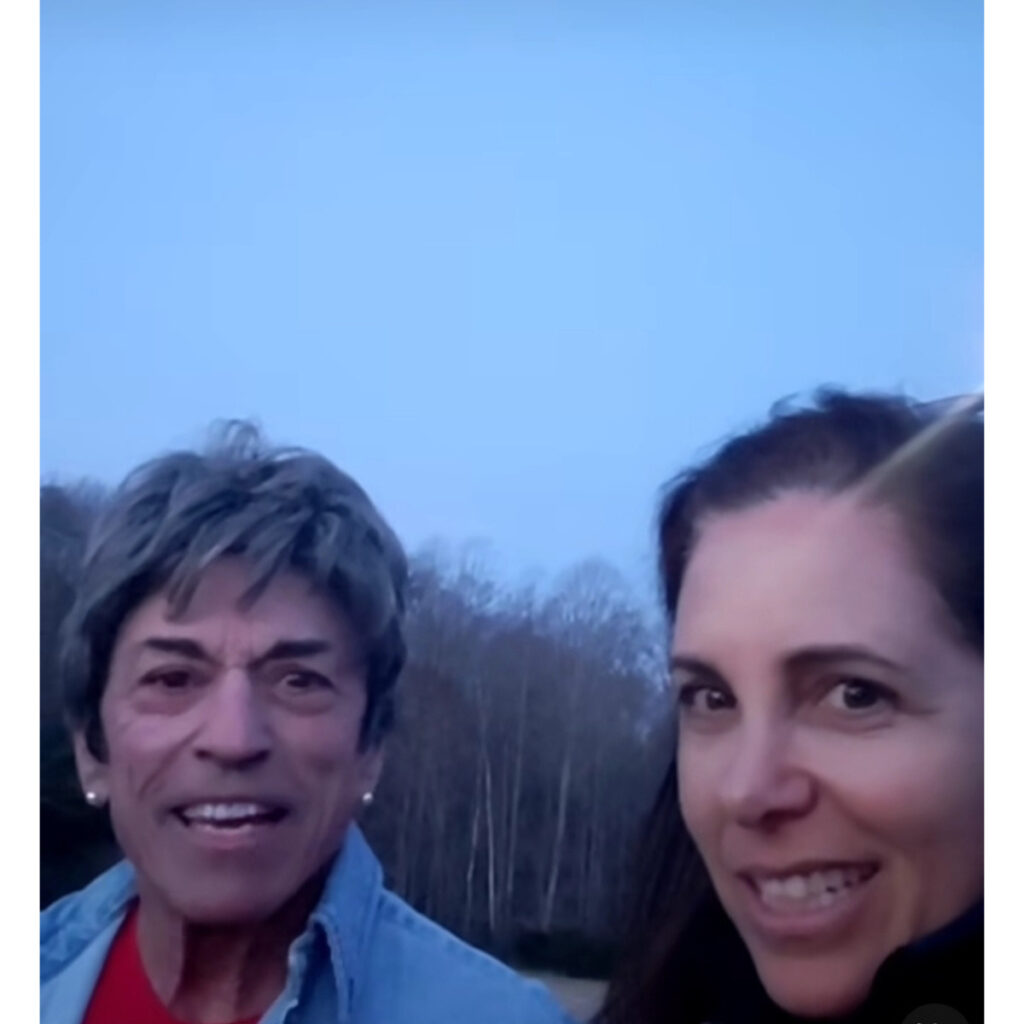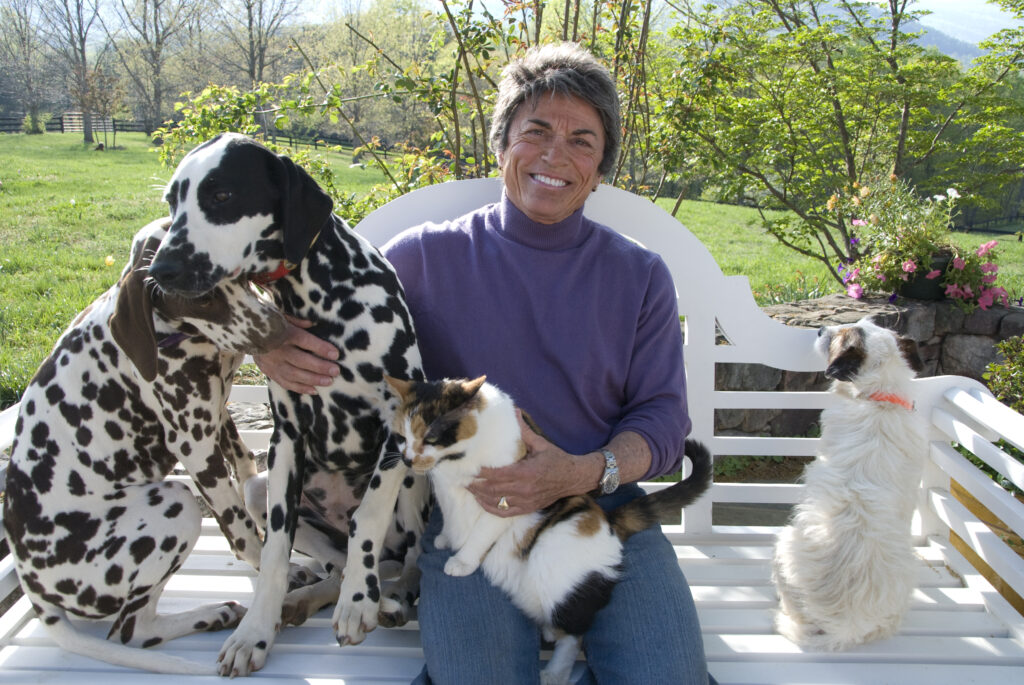Rita Mae Brown: Famed LGBTQ author and feminist
Feminist and LGBTQ author Rita Mae Brown is interviewed by fellow author Felice Cohen in celebration of the 50th anniversary of landmark lesbian novel Rubyfruit Jungle.
I’ve heard the proverb “never meet your heroes.” The possibility for disappointment and all that. But if your hero is Rita Mae Brown—poet, New York Times bestselling author of the groundbreaking Rubyfruit Jungle, pioneering LGBT-rights activist and Emmy-nominated screenwriter—then the proverb goes right out the window.
I’d first discovered Ms. Brown in 1993. I was 23, fresh out of college and crushing on my boss, Sarah, a woman 34 years older. One of my “duties as assigned” was to memorize poems, including one by Rita Mae Brown. Shortly after the assignment, Sarah and I began a secret love affair that lasted until her death ten years later, but whose mark would last indefinitely.
Fast-forward 30 years. My book, Half In: A Coming-of-Age Memoir of Forbidden Love, about that secret affair, is published. Coming full circle, Ms. Brown not only endorsed Half In, but agreed to host an author talk with me in New York City. In preparation, I went down to Virginia to visit.
In the morning I watched Ms. Brown, Master and Huntsman, lead a hunt across her sprawling 600-acre farm at the base of the Blue Ridge Mountains. Afterwards, we spent the day together. Seated in her SUV, her beloved dog Holly between us, Ms. Brown, who is friendly, funny, and still sharp as a tack at 78, and I spoke for hours.
Felice Cohen: How does it feel that it’s been 50 years since Rubyfruit Jungle was published?
Rita Mae Brown: Amazing. Feels like yesterday in some regard. I will never look at it the way the rest of people do. To me, it was my first novel so I had to make the big decision: first person or third person? But it helped liberate people, helped them get the courage to do what they needed to do. People have said, “You saved my life.” I don’t see how I could. I believe all I did was open a door. You still had to go through it.
FC: Rubyfruit is now banned in some places. How do you feel about that?
RMB: I’ve come full circle. I was banned when I started out. The Catholic Church banned me. You couldn’t get my book wherever the Catholic Church is strong. Then that faded away. But all you do is make the thing more fascinating, right? Kids will kill to do something that seems rebellious. Banning is not going to solve everybody’s problems, particularly those that fear these books. You only make them more powerful. They think if they get this passed by a law it’ll change people’s behavior. Nothing changes people’s behavior. They just go underground.



FC: Was Rubyfruit based on your life?
RMB: It had elements, but I like stories about people who stand up and fight. The book was about this outspoken girl and woman who wants to live her life the way she wants to live it. I would hope everybody comes to those conclusions whatever and whoever they are.
FC: You were part of NOW, Lavender Menace and the Furies. What made you get out of politics and focus on writing books?
RMB: The Broadway show Follies. It changed theater and it changed me. I saw that as a door, not to the future, but to the past. There were things in Follies that had to have been done in ancient Greece. It was extraordinary. But then when Alexis Smith walked on the stage I couldn’t even think. I don’t think anybody ever hit me that hard. I would stand at the stage door every night just to watch the actors come out. And then I wrote a thank you note to the ladies, and they invited me in. They took one look at me and said, “This kid needs to eat.” Somebody would give me a sandwich. A couple of times Alexis took me to lunch. I had terrific conversations with her. She’d read a couple of things I was working on and said, “Get out of politics. Leave the women’s movement. Let it all go because what you have, very few people have. Artistic talent is much more rare than this political crap.” She was very realistic. She said, “Just get out.” And I did. I left and devoted myself to writing.
FC: I read thatRubyfruit was rejected by big publishing houses before it was picked up by Daughters, Inc.
RMB: Yeah. Daughters was owned by June Arnold, who was also writing a book called Sister Gin. Daughters gave me $1,000. I couldn’t believe it. I didn’t have a dime, so now I could buy shoes. And then the book started selling. June and her business partner, a woman named Parke Bowman, couldn’t handle the volume. Bantam (Books) offered them $250,000. Daughters owned the book. I didn’t own it. June said, “We’re going to give you half.” There was no reason they had to do that. Then Toni (Morrison) fought for me to get money because she was in the National Endowment for the Arts and all these white men didn’t want to read my work or give me an endowment. And Toni got me one. Between those three women I was able to devote myself to writing.
FC: You also wrote for TV. What show did you work on?
RMB: “I Love Liberty,” a two-hour variety show celebrating the First Amendment, for which I got my first Emmy nomination. Who would think of that, but Norman Lear. He was fabulous.
FC: And you wrote a horror movie?
RMB: Just for fun. I’ll try anything. I’m not a person who’s afraid to fail because failure is feedback for success. Most people are just rigid with fear of what are people going to think.
We stop at a deli.
RMB: You go. I’ll sit with Holly so she doesn’t have a fit.
FC: What would you like?

RMB: Something with chocolate.
FC: No real food?
RMB: (Smirks) Fine. A Turkey sandwich with lots of mayo and any kind of cheese.
Fifteen minutes later, I return with a turkey sandwich and a piece of chocolate cake. RMB is listening to classical music. When she sees the chocolate cake her eyes light up.
FC: Ever think of writing a sequel to Rubyfruit?
RMB: God no. That’d be awful. No matter what you did, half the people would be furious.
FC: Is there a new genre you’d like to try writing?
RMB: Greek and Latin. I would like to write about The Odyssey. I think it’s really about the relationships between men and women. I think there are so many other ways to look at that story. I’d love to write about that or teach it. I love Greek verbs. I’m not good at it, believe me. But I love Latin. I use it every day. I can’t imagine not having that. But then again, I can’t imagine not riding horses either. How can you live without horses?
FC: How do you decide which horse to ride on a hunt?
RMB: They tell you. There are horses that love hunting and horses that don’t want to do it. You ride a horse a couple of times you start to know. I never force a horse to do something it doesn’t want to do.
FC: What other authors do you love?
RMB: Zora Neale Hurston is a great writer. But think about the Harlem Renaissance. If it was such a great renaissance, why did they treat Zora like shit? Why did all those great intellectuals dump on the woman? She and Alice Walker and Toni Morrison are among the best we have. What gave them the energy? Was it just anger? The love of the language?
RMB Pulls into the entrance to her farm and parks in front of a two-story barn. Headquarters, she calls it. Inside are worn couches, cozy armchairs, and a wood-burning stove. Various sized antlers found on her property hang on the walls, along with sporting art of foxhunting scenes. A staircase leads up to a loft. We sit outside and settle in with our sandwiches. The sun is still high, the Blue Ridge Mountains a short distance away, five house dogs sit at our heels hoping for a morsel. We talk about soul mates, family, email (RMB doesn’t own a computer), and Cancel Culture.
When the sun dips behind the mountains a chill fills the air. Climbing back into her SUV, we stop at the kennels. A dozen pens house fifty barking hounds. Two, who had been separated from the morning’s hunt, are outside the fences, waiting. They knew to come home. Rita Mae leads them into their pens and drives to my rental car, parked in a field, bathed in the light from a full moon. Half a dozen deer, grazing, take off, their white bushy tales a fading blur. Before parting we hug. She is no longer Rita Mae Brown: famed novelist, LGBT icon, feminist, Emmy-winning writer. She is simply, Rita Mae: friend.

About the author
Felice Cohen, known nationally and internationally as the woman who lived in one of the world’s smallest apartments, is an author, speaker and Holocaust educator. Her second book 90 Lessons for Living Large in 90 Square Feet (…or more), the recipient of numerous Self Help book awards, was inspired by the YouTube video of her 90-sq.-ft. NYC studio that went viral with over 25 million views, gaining media attention across the globe. As the grandchild of two Holocaust survivors, Felice is also the author of What Papa Told Me, a memoir about her grandfather’s life before, during and after the war. The book has been endorsed by Elie Wiesel and Yad Vashem in Israel, is taught in schools across the country, has been translated into Polish, and has sold over 40,000 copies around the world. Half In: A Coming-of-Age Memoir of Forbidden Love is about a secret, lesbian, age-gap love affair I had just after college when she was 23, with her boss, a woman who had a long-term partner and was 57. Half In has been endorsed by Rita Mae Brown, author of Rubyfruit Jungle, and was recently highlighted by Publisher’s Weekly.






